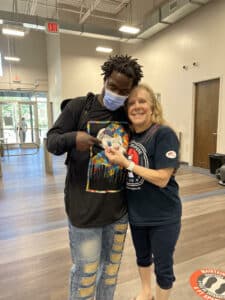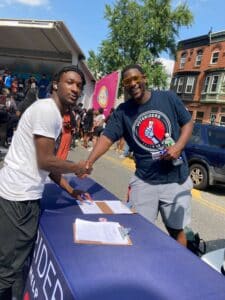VoteRiders Reaches Americans Who Are Disproportionately Impacted by Voter ID Laws
August 17, 2023
In the midterm election cycle (2021-2022) VoteRiders ran its most ambitious and far-reaching program to date.
Over the course of two years, we directly reached over 7 million voters with ID information and help.
But did it make an impact? I’m excited to share the results from our most rigorous program analysis to date and — spoiler alert — yes, VoteRiders’ work made a real difference.

Following the 2022 election, we conducted an analysis of a sample of 134,000 voters we assisted during the year via different methods:
-
-
- in-person ID assistance
-
- virtual ID assistance
- text messaging
- and letter-writing.
We shared this sample with an independent data firm for their analysis. The firm conducted a cross-reference of our sample with the public voter file (to gauge registration and voting rates) as well as to provide us with an estimate of the demographics of these voters (race, income, education, and age).
The analysis found that VoteRiders’ work effectively targets the individuals who are most often left out of voter mobilization efforts and who are disproportionately impacted by voter ID laws.
Across the sample, voters of color, low-income Americans, and those with a high school degree or less represented the vast majority of voters we contacted with free voter ID information and help offers.
While campaigns and parties often ignore “low propensity” or unlikely voters like these individuals — who have limited-to-no voting history — at VoteRiders, we center their needs as part of a long-term strategy to expand and diversify the electorate by removing the powerful barriers created by ID laws.

Preliminary research shows VoteRiders’ exciting potential to engage new and unlikely voters in the electoral process via our ongoing ID assistance work.
Our partner, Houston Justice, offers a promising case study for how to effectively leverage site-based ID assistance programs to register and turn out new voters. The individuals they engaged successfully registered to vote at rates far higher than demographically comparable peers, with 80% of voters engaged via ID assistance being active registered voters by the midterm elections.
While voter turnout rates for these individuals were much lower (10%) than desired, it is worth noting that over 50% of these individuals who did vote were doing so for the first time.
By strategically and precisely targeting the eligible voters whose ballots are rejected for ID-related reasons, VoteRiders saw impressive results.
During the midterms, our outreach work in Texas helped voters cast their ballots by mail with overwhelming success after there were unprecedented ballot rejections due to a new voter ID law a few months earlier.
VoteRiders’ targeted outreach, via letter-writing and text-banking, between May-October 2022 was critical in alerting nearly 15,500 Texas voters — whose ballots were rejected in the March 2022 primary election due to the new law — and ensuring their voices were heard.
Our outreach provided them with the updated, accurate, and timely ID information they needed so their ballot would count in the general elections.
Over 92% of the Texas voters we contacted via letter-writing, and 87% of those we contacted via text, were able to successfully vote in the midterm elections after having their ballots rejected in March.

Similarly, our work in Georgia effectively alerted unlikely voters to ID requirements for voting, and supported electoral participation for individuals who lacked ID.
The vast majority of the 116,000+ voters we contacted did not have the ID required to vote.
We sent handwritten letters and text messages to these targeted voters offering free help from VoteRiders.
19% of letter-writing recipients and 23% of text message recipients successfully cast a ballot in the midterms.
18% of the letter recipients and 13% of the text recipients who voted were doing so for the first time.
These voters will now be prepared with the ID information and documents they need to vote in every election!
As we look towards the 2024 presidential election cycle and beyond, we’ll be sure to apply this data to all of our voter ID education and assistance efforts moving forward.
We’ll even more intentionally include regular voter registration and voting reminders into our ID assistance work.
Our work starts with ID help, but we can’t stop there if we want individuals to use their new IDs to cast a ballot that counts. We plan to replicate the effective voter registration techniques that Houston Justice employed as part of its ID assistance while also mainstreaming voter registration and regular voting reminders into our quickly-growing portfolio of in-person and virtual voter ID assistance work.
We will also be strategically filing open records requests in states with new and changing ID laws which will allow us to precisely target our outreach to the voters who need us most.
We’ll replicate our successful Texas and Georgia strategies in as many states as possible in 2023 and 2024, and have already done so this year in Arizona, Georgia, Ohio, North Carolina, Texas, and Wisconsin.
Our work is already moving the needle in important ways with new and more diverse voters, but we can continue to refine our strategies for even more impact going forward.
Against the backdrop of new and stricter voter ID laws passing at a rapid pace (eight in 2023 already!), the need for VoteRiders’ work has never been greater.
We are committed to continuously evaluating and improving the effectiveness of our work to meet new and emerging challenges and help millions of voters overcome the barriers created by voter ID laws.
As a nonprofit organization, we rely on the generosity of individual donors and dedicated volunteers to power all of our work. Consider giving a gift or taking action to protect the freedom to vote!

Lauren Kunis is the Chief Executive Officer and Executive Director at VoteRiders. Lauren has spent her career working to strengthen democracy at home and around the world, designing and managing impactful voter education, civic engagement, and government accountability programs. Lauren most recently worked at Nonprofit VOTE, where she was the National Voter Registration Day program director and led the holiday to a record-setting number of voter registrations in 2020.

